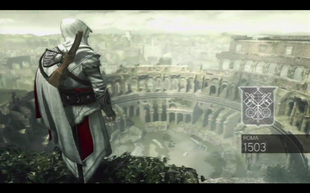 Rome: Home of pasta, Vespas, and Assassins. As more of the people close to you die, you set your sights on retaking Italy for the Assassins. Your efforts elsewhere have driven the Templars to Rome. You must go to Rome, make new allies, and end the Templar threat.
1. Gameplay
The ups and downs of both games are pretty much the same. On the plus side, the parkour mechanics (see "Definitions") are generally very good, the weapons are fun to use, and the main (in-Animus) storyline is awesome. Brotherhood has more properties to buy, more weapons, and some pretty cool armor. The main storyline has Desmond, the player's character, reliving parts of his ancestor's life. The overall conflict is between the Templars, who try to make the world a peaceful place through total control, and the Assassin's, who try to maintain humanity's freedom. The two cannot co-exist, and as a result are in constant conflict. Desmond and his ancestors are Assassins trying to overthrow the Templar despotism. The Assassins are highly skilled in both stealth and combat. The player is easily able to take out dozens of guards while taking minimal damage. For those that don't know what "parkour" is, the player is able to climb up walls, jump from ledges, and other similar extreme stunts with ease. The game hinges on the player's ability to climb things that would normally be very dangerous. It's one of the biggest highlights of this game. Unfortunately, a lot of the minuses from AC2 are back and with a vengeance. Like I said before, generally parkour mechanics are good, but when they fail in Brotherhood it’s often very costly. I would frequently find my character jumping up and down on a beam like a crazy person because the game didn’t allow me to jump in one particular direction, whether or not there was an obstruction in front of me. Enemies would sometimes attack two at a time, although this problem seems to have been cleaned up since the first two games. The real-world storyline was still just as confusing and just as pointless as the previous games. The ending was an absolute bomb (in a bad way) that left me so speechless that I honestly could not believe the writers went in the direction they did. It failed to answer any of the questions it raised in the beginning. I was left hoping that the series will not continue in the direction it seems to be charging toward. Aside from that, I had two major problems with Brotherhood that weren’t present in the previous games. First, the hidden blades are beefed up to a near unbeatable level. This is done by giving the player a “killstreak”. If the player kills one enemy (with any weapon), the player can kill another nearby enemy instantly. This continues until the player either stops or is hit with an attack. The problem is that this makes almost every weapon except the hidden blade practically useless in open combat. Previously, the hidden blade was excellent for silently taking out one or two targets. Now the hidden blade is the fastest weapon in the game, meaning that the player is able to take out dozens of enemies in less than a minute. It also means that the other weapons have very little purpose other than their specialized skill (such as throwing large weapons at enemies on horseback). My other problem was that the upgrades in armor took so long to unlock that by the time they were available I had no need for them. The last, “most powerful” upgrade was only unlocked towards the end of the game, but most of the major battles were finished by that point, so the extra point or two of health boost was meaningless for me. And even so, I had already taken the time to unlock the “Armor of Romulus”, the strongest armor in the game, so the junk the armor shops sold me was just that, junk. Still, all of these are minor gripes considering the overall quality of the game. It’s definitely something I would recommend to my friends, provided those friends were mature enough to handle the rather unnecessary sex scene early on in the game.
Each of the four guilds also has individual challenges that the player can accomplish. Completing the challenges gives that particular guild’s members additional abilities that can help the player. A multiplayer mode is also included. For those who wish to play with other players online, this mode can add extra hours of gameplay in addition to the main storyline. More information on the multiplayer mode can be found in the “online community” section.
Normally I consider problems with storyline or direction to be merely annoying rather than frustrating, but the ending of Brotherhood frustrated me to no end. The fact that Desmond was forced to kill another main character, Lucy, without any explanation and the fact that the entire story felt incomplete because of the lack of any real ending left me entirely unsatisfied. It was a huge, huge stain on an otherwise very well done game. 2. Parental Notices
However, each weapon type has a variety of finishing moves that are available to the player, and will be used sometime in the game (if not frequently so). These can involve anything from driving an axe forcefully into an opponent's head to impaling enemies on poles. They are gruesome, graphic, and definitely a bit icky. But they are a lot of fun to pull off. There is blood in this game. It doesn’t splatter onto the ground, but it sprays off of the enemies when they are hit. The blood is especially obvious during the finishing moves. Dismemberment is not an issue, although impaling definitely is. The player is able to stab through enemies with swords, drive axes into enemies’ skulls, and drive polearms into enemies’ stomachs. While the violence will be very graphic, the quantity of violence will range. Usually the player will not be in open combat and will instead be climbing, talking to people, or exploring the landscape. However, combat is definitely a large part of this game and should not be overlooked.
I think the most disappointing part about this particular scene was that it was completely pointless. In AC2 Ezio had a sex scene with the girl that he was in love with, so that at least made a bit of sense. They were young and infatuated with each other. However, this scene wasn't about love at all. In fact, the woman in the scene later tells Ezio that their sex was purely about politics and had nothing to do with romance. It takes the possibly positive message about sex (about it being between loving, consenting adults) and makes it just another thing that can be used as a tool to manipulate people. I thought it to be a completely unnecessary inclusion in the game. The courtesans are also back. While they are not explicitly sexual, they do distract the guards by dancing somewhat provocatively. The courtesans are basically geishas, but in the Assassin's Creed series they're used to distract the guards from Ezio. There are other dialogs in which sex and sexuality are discussed, but they are a relatively minor part of the overall gameplay experience. They're also minimized when compared to the sex scene or the courtesans.
The poison is relatively fast acting. Soon after being poisoned (by either a poisoned blade or darts), the target slows walking and appears to be drunk. The target then takes out his weapon and begins swinging wildly at what can only be hallucinations. If the weapon hits any nearby guards or civilians, it will almost certainly be fatal. After about 15-30 seconds, the target will also fall over dead. Poisoning is also an ability in the multiplayer game mode, though it is hardly ever used.
3. Other Factors
The Vatican is one of the five main districts of Rome in Brotherhood. The player will find a multitude of cardinals and Papal Guards in this district. The entire region of Rome also has many churches and basilicas for the player to climb on and explore. Without religion, the plotline in this game would not exist.
There are ways to get around the guards without lethal force, such as with smoke bombs, but those are only effective over a small area, a short amount of time, and are very, very expensive. So in short, you’re going to have to kill a large number of guards in order to complete the game. The underground nature of the assassins’ allies is back as well. Thieves, courtesans, and mercenaries are all back and willing to aid the assassins in their fight against the Borgias. It essentially boils down to one organized crime group fighting another. Pickpocketing is also back. As before, it’s the simplest and fastest way to gain a few hundred florins. Toward the end of the game when income from property is in the thousands of florins every 20 minutes the necessity for pickpocketing is significantly reduced. As a player commits more anti-law actions, such as assassinating targets or pickpocketing in public, he will gain notoriety. Too much notoriety will cause all guards to instantly attack you when they see you. A player can remove notoriety by doing one of three things. A player can remove up to 25% of his notoriety by tearing down any one of a wide variety of “wanted” posters around town. He can remove up to 50% of his notoriety by bribing a herald to stop talking about him. Finally, he can find and kill a “corrupt official” in public to silence anyone else who would come out and speak against him. It’s definitely a violent way to intimidate others into submission.
There are a few glaring problems with the multiplayer community of Brotherhood. The primary problem is that new players are handicapped considerably compared to their veteran counterparts. As a player progresses he gains levels and thus gains new abilities such as smoke bombs, fireworks, guns, and poison. The players with these abilities have a significant advantage over other players, especially players with the hidden gun. This means that team battles are almost the only way that a new player can enter the scene and survive long enough to have fun. In fact, the only modes I ever enjoyed playing were the team modes because the skill of the veteran players balanced out the lack of skill of the novice players. I played the multiplayer for a few hours and had no real problem with the community, but if you’re looking for an excellent multiplayer experience this is not the game to buy.
These kinds of events are an integral part of the game, however. Players must climb tall buildings, cliff faces, statues, and other large objects and then proceed to jump off of them. It’s the highlight of the game mechanics.
As with the previous Assassin’s Creed games, kidnapping is used as a device for a few missions in the game. The head of the Rosa in Fiore, the courtesan headquarters, is kidnapped and held for ransom. Cristina is also kidnapped by Cesare and imprisoned within his castle. In the DLC, Leonardo Da Vinci is also kidnapped and held captive until he helps his captors get into the Temple of Pythagoras. Incest Cesare and his sister Lucrezia have an incestuous relationship and are seen to kiss intimately on camera. The sexual nature of the relationship never goes beyond that but is discussed and implied multiple times in dialog. Execution (Adult) When Cesare invades the Villa, he eventually finds and captures Mario (Ezio's uncle) and executes him while Ezio watches. The head of the Rosa in Fiore is also kidnapped and executed in front of the player despite Ezio’s ability and willingness to pay the ransom request.
0 Comments
Leave a Reply. |
Like what we do? Want to see more? Donate to the site using the button below!
Not sure what a term means? Read the definitions!
Not sure what a review section is about? Find out more information!
|
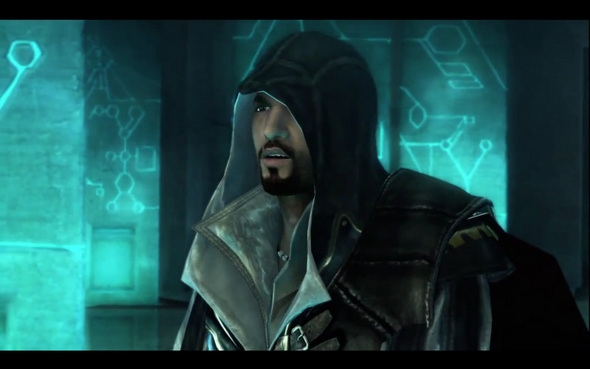
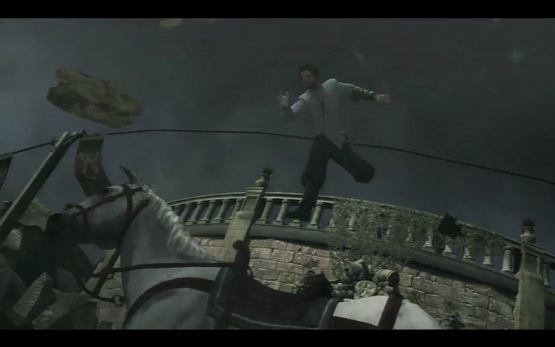
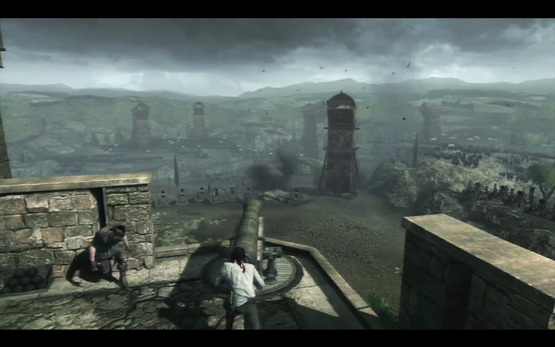
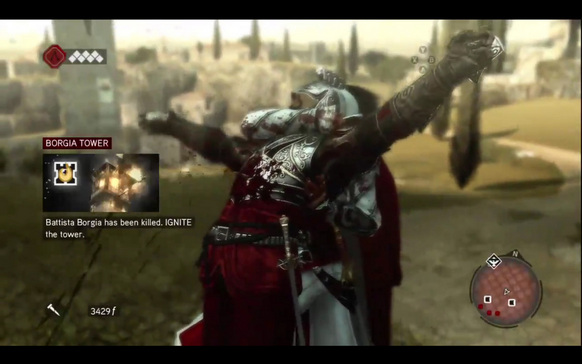
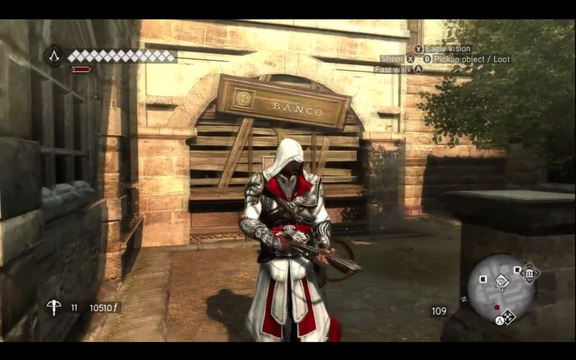
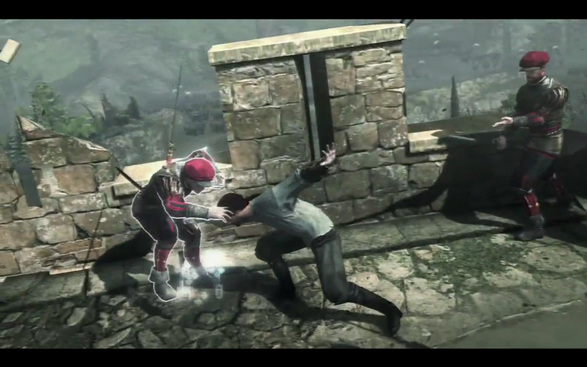
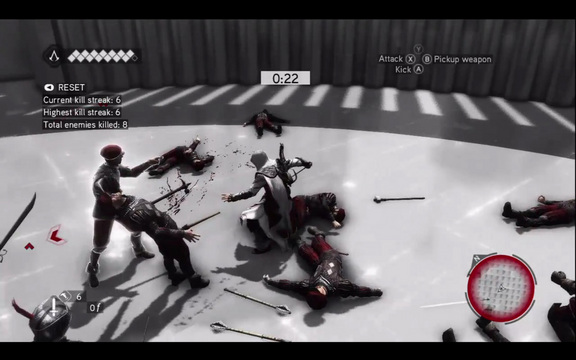
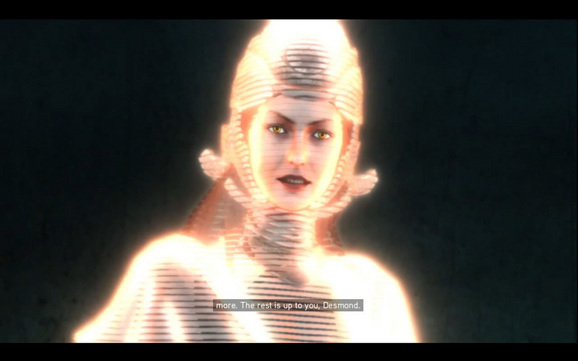
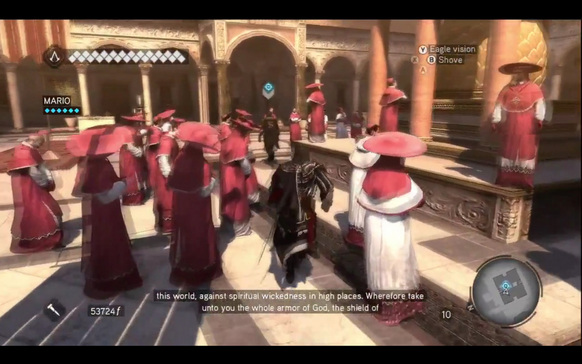
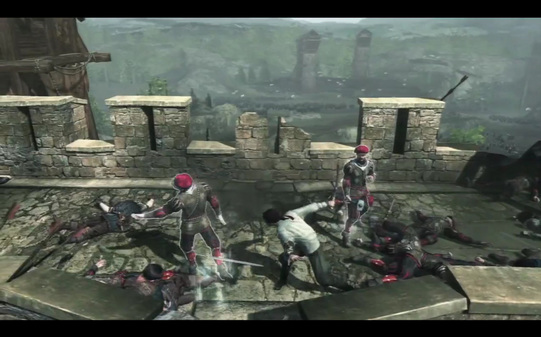
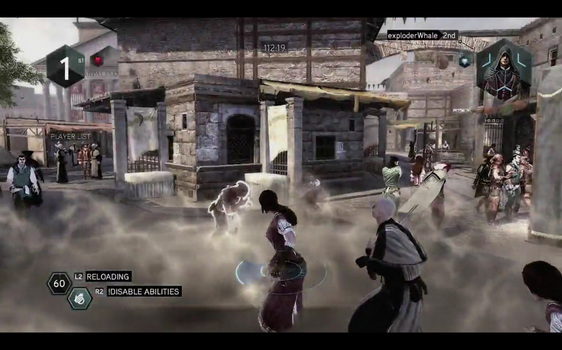
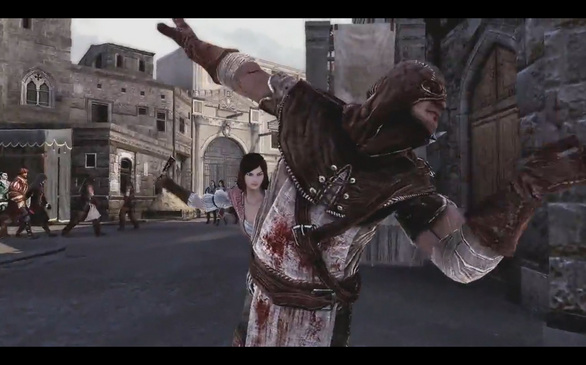
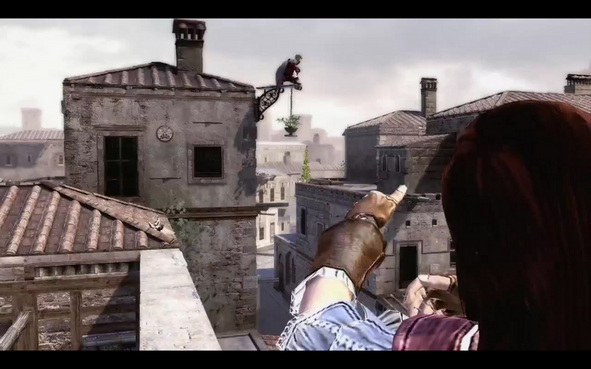
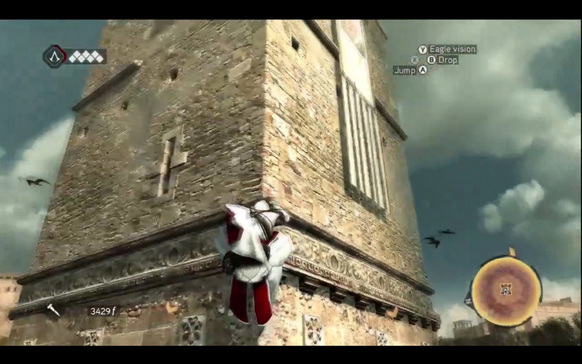
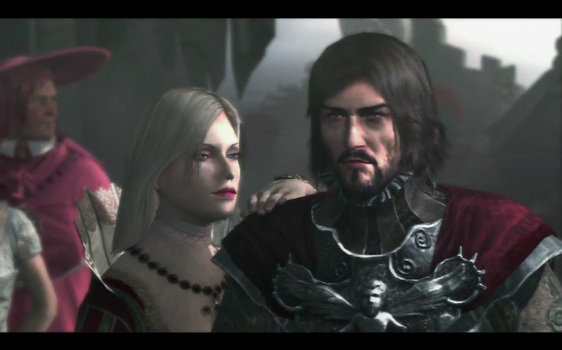
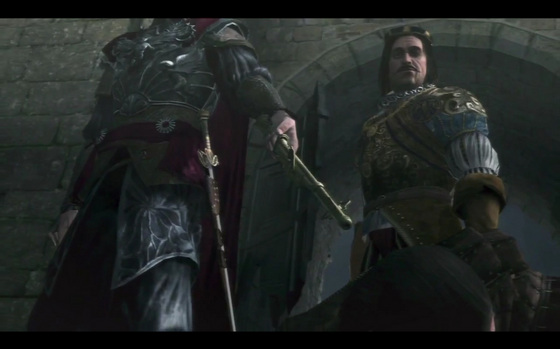
 RSS Feed
RSS Feed